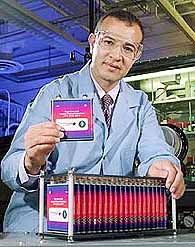 Lithium Iron Phophate (LiFePO4) batteries may soon take over the market for electric cars and plug-in electric vehicles. Based upon lithium ion technology, LiFePO4 batteries offer greater safety plus higher output than lithium cobalt dioxide (LiCoO2) batteries that are used commonly in laptops, mp3 players and cell phones.
Lithium Iron Phophate (LiFePO4) batteries may soon take over the market for electric cars and plug-in electric vehicles. Based upon lithium ion technology, LiFePO4 batteries offer greater safety plus higher output than lithium cobalt dioxide (LiCoO2) batteries that are used commonly in laptops, mp3 players and cell phones.
Developed by Dr. John Goodenough (as opposed to Boris Badenov) at the University of Texas, LiFePO4 batteries have seen wide acceptance recently in Asian countries, but still have not made inroads in the U. S. marketplace. This is about to change, however.
With recently safety concerns over other laptop batteries catching fire and the ensuing recall, LiFePO4 batteries are now being used by some manufacturers as a safer alternative. LiFePO4 batteries are also being used in electric bicycles and power scooters.
For electric vehicles and plug-in electric cars, the LiFePO4 batteries such as those on the electricvehiclesnow.com website operate well in temperatures up to 400-degrees F, last for 6 to 7 years at a charge-discharge cycle of over 3,000.
The biggest player in the LiFePO4 marketplace for electric vehicles, however, is A123 Systems that has teamed up with GM to develop these Lithium Iron Phophate batteries for the Chevy Volt plug-in hybrid. Another big player is Lithium Technology Corporation who has been working with GM, Toyota and U. C. Davis to develop LiFePO4 batteries for all-electric and hybrid vehicles.
We are on the cusp of a revolution in battery technology. Tomorrow’s choice for safe, high-output rechargeable batteries for vehicles will be Lithium Iron Phophate.